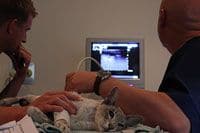Kidney Failure In Pets
A serious problem for dogs and cats
Kidney failure, also known as renal failure, can affect dogs and cats. Your pet’s kidneys work like human kidneys. They filter substances in the blood that are removed from the body via their urine. The kidneys also help maintain the concentrations of salt and water in the body as well as various minerals such as calcium and phosphorous. If the kidneys don’t function correctly, toxins will build up and the pet will become ill.
Kidney disease can be hereditary or the result of aging, however many presentations are the result of ingesting toxic plants, foods or medications.
Symptoms
- Increased water consumption
- Increased, decreased or no urine
- Blood in urine
- Change in appetite
- Vomiting
- Bad breath, pale gums or mouth ulcers
- Dull, depressed or stumbling as though drunk
Emergency treatment before transport to a veterinarian
It is important to note that the above symptoms are not specific to kidney disease or kidney failure. They are seen in other illnesses that may range from mild to severe. If you notice any of these symptoms or you are concerned, it is best to seek veterinary help to determine the cause of your pet’s illness.
Kidney disease is a life threatening condition, seek veterinary attention immediately.
What to expect at the vet
Intravenous fluid to rehydrate the patient.
Intravenous medications for gastrointestinal issues, to assist urine production or manage excessive vomiting, and to provide antidotes to toxins (if available).
Blood testing to assess the severity of the illness and monitor response to treatment.
Urine testing (if a urine sample is able to be collected) to identify infection, concentration and other abnormalities.
Radiographs to determine the size and shape of the kidneys.
Ultrasound to assess changes to the kidney
Hospitalisation for therapy of the underlying cause such as toxicity or infection.
If left untreated, kidney failure can be fatal.
Prevention
Kidney problems occur due to a variety of reasons. The best prevention is to ensure there are no toxic substances, such as radiator coolant or human medications, accessible to your pet. You can read more about Pets and Toxins in this article. It is also important you ensure your pet has access to fresh water at all times.
Kidney issues can be caused by underlying illness or hereditary conditions. If your pet is susceptible to this condition, it is best to have regular check-ups with your veterinarian to ensure they are fit and healthy. To know more about medical issues relating to pet’s kidneys read our article about Kidney Stones in Pets.



